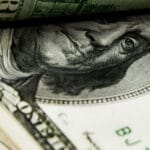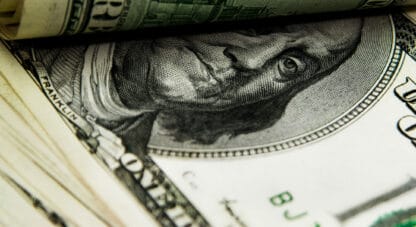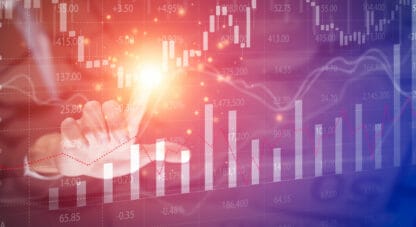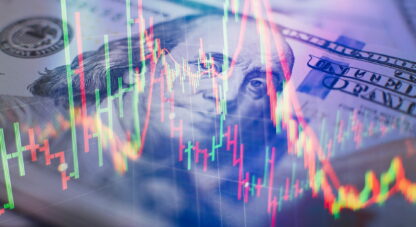Podcast: Play in new window
- Global markets go "Black Friday," volatility rises 50%
- What does "Financial Reset" mean?
- Could a Turkish default upend the EU basket?
The McAlvany Weekly Commentary
with David McAlvany and Kevin Orrick
"Interest Rates CANNOT Rise"—Plan B Anyone?
November 30, 2021
"Bond buying program, which $1.85 trillion pandemic emergency program, it comes to an end in March 2022. So we’ve got these issues in Turkey which tie directly into the European financial system. The latitude that the ECB has to step in and solve that problem goes away over the next 90 to 120 days. Inflation being in the wind changes the possible intervention dynamics, because it changes the political tolerances for monetary policy options."— David McAlvany
Kevin: Welcome to the McAlvany Weekly Commentary. I’m Kevin Orrick, along with David McAlvany.
I was listening to the Harold James interview again, and I was just really struck with something, Dave, that we’ve talked about for a long time, and that is, centralization sort of managing future history in a centralized way, or what we would call free market, which is decentralization and discovering history as it goes forward. So the difference between managing future history and discovering future history seems to be what it all boils down to. And I’m looking at the markets right now, the amazing volatility that we saw last week when the Omicron was announced, and now we’ve got this new fear worldwide. And my question is, how much of it is centralized managed future history, and how much of this is being discovered as we go?
David: That’s what the market’s trying to figure out. So we had a tough week for most commodities. Palladium was off 14% last week, platinum almost eight, silver nearly seven, gold over 3.5%. Oil got clobbered, down 10%. And so that’s what we’re seeing, is the market saying, “Wait a minute, if there’s going to be a major imposition and a return to shutdowns and lockdowns, we know what that looks like and we know what the implications are.” Interestingly, copper was the relative winner. It only gave up 2.7%. And natural gas was up 7.5%. And it flipped and has given up twice that much since then, down 18% off of its peak.
Kevin: One, so we talk about discovering future history versus managing future history, volatility seems to be a good measure of shocking discovery.
David: That’s right. It’s a surprise. And somebody was caught on the wrong foot. If you look at VIX, the difference between puts and calls, the VIX was soaring higher last week. By the end of the week, it had increased 50%—
Kevin: Wow.
David: —signaling a large swath of investors caught on the wrong foot. And what that means is that everybody’s been pressing forward with their “risk-on positions” coming into the end of the year. And they’ve got positive seasonality. That’s typical here at the end of the year, and they weren’t prepared for Omicron.
Kevin: Isn’t it interesting that it’s called Omicron? My hobby is astronomy. One of my hobbies is astronomy, and I thought one of these days I’m going to sit down and really learn the Greek alphabet, because the stars, they use the Greek alphabet. I never really mastered that, but I did notice there was a strange leap of a couple of letters in the Greek alphabet in the naming of Omicron.
David: Well, there’s a strange leap. There’s also an addition of a few letters too. Bush had his nucular, and Biden has his Omnicron, which is—
Kevin: Said it over and over, Omnicron.
David: —Omnicron. But I guess—
Kevin: Sounds like a superhero.
David: —And I don’t think Greek was necessarily in his educational repertoire. So no, you can thank the World Health Organization, for demonstrating the high art of diplomacy, skipping over nu and xi, or “kai.” And it’s spelled the same as Xi, which is X-I, in the Greek language, so—
Kevin: You wouldn’t dare name it Xi, would you?
David: —Yes.
Kevin: It didn’t come from oh, I mean, China.
David: And actually, X-I is your transliteration. If you’re looking at the Greek characters, it’s different, of course. But yeah, that allowed for us to gloss over what would’ve otherwise been a refresh, again, of where the gain of function for COVID was engineered. Highly recommend the Financial Times’ 12-page article, from November 17th, titled Genetic Engineering. And it gives a very thorough reporting on the National Institute of Health Funding, the Fauci involvement, and the Wuhan lab’s aggressive experiments with COVID over a five to 10-year period, with US financial backing. So this is not tin foil hat stuff. There is a selective presentation of facts by various news outlets, but the fact that COVID and the experimentations of COVID source from Wuhan, well read it and see what you think. But the Financial Times, I thought, did a very good job of giving the chronicle of really the last decade and a half of development of what is now, oh today, Omnicron.
Kevin: That reminds me of a phrase your father taught you. I think you still remember it, don’t you?
David: It goes from the past, into the present. Always mistrust the obvious.
Kevin: Well, we just came out of the Thanksgiving holiday, and yeah, it was wonderful. I did something that I haven’t done in a long time. My wife’s birthday actually is on the 26th, and that was Black Friday. I’ve always hated that. I’ve hated that during the time of Thanksgiving, we have this thing called Black Friday, which you can’t possibly be satisfied on Thursday. You got to go out and try to satisfy yourself with your money on Friday.
But it was interesting, because I said, “Sweetie, I want to be with you this time. I’m not going to let you just go out Black Friday shopping without me.” So we went to several stores, Bed Bath & Beyond and TJ Maxx. The thing that struck her the most— So first of all, there was hardly anybody out. But the thing that struck her the most was that the shelves were virtually empty. We just don’t see inventory anymore. And so the Black Friday sales, whatever that looks like, it looked very different. But at the same time that we were in town, the markets were giving us a Black Friday sale. Did you see that?
David: Well, just to be fair to Bed Bath & Beyond, there’s a huge criminal element these days that’s coming in and just swooping the inventory off the shelf. So the fact that they don’t have anything on the shelves, I mean—
Kevin: Well, they go in with calculators. They make sure it doesn’t exceed a thousand bucks, right?
David: They actually reported this in Bed, Bath & Beyond’s quarterly report, that they’re having a significant loss this year. And the reason why they’re not hitting their numbers is because of their criminal element.
Kevin: Wow.
David: That was fascinating. You mentioned Black Friday, and the fact that there’s a birthday there, and it’s all a little bit awkward. Alphaville, which is one of my favorite sections in the Financial Times, had all of these quotes relating to Black Friday. And Black Friday depresses me each year. I hate the way consumerism brings out the worst in people, turning them into hysterical monsters obsessed with getting the best deal. Black Friday is a black mark on the soul of humanity. It’s time to stop this rabid consumption of cheap and often plastic products. I can imagine a guy wearing a flannel shirt and carrying a Norwegian style ax as he’s talking about authenticity. The length of his beard and the complaint about plastics. Anyways, I had a laugh talking about, we really don’t like Black Friday.
Kevin: It is weird though, Dave. Because I was like, all right, what do we really need? Do we need another TV? I mean, what does it represent?
David: Yes, stocks were on sale. I mean, to your earlier point, stocks were on sale. It wasn’t just flat screens.
Kevin: That’s right.
David: And so, yeah. Market volatility in the backdrop and preceding the global Black Friday sale for commodities and the stock market. And this is on a global basis. You’ve got the dynamics in China, which have yet to ease meaningfully. You got the developers, these are your property developers, which are in a slow-motion train wreck. And it’s an event that appears stretch beyond the average investor’s sort of momentary attention span. That was last week’s news, so it must be resolved. No. In fact, it’s still there. Risk indicators all measured palpable concern by the end of the week last week. And then we got the rally on Monday. And you’d expect the risk indicators to have eased following the shortened holiday trading session and now we’re back in business and we’re not so worried. Maybe Omnicron— I’m sorry. I just have to keep on saying it. It’s like—
Kevin: Okay, Joe.
David: —Nucular.
Kevin: Yeah. Yeah, nucular.
David: Maybe it’s not going to be such a big deal. It’s not as transmissible. Et cetera, et cetera. But the stress indicators within the financial market are still very elevated. Our colleague Doug Noland was noting that the most important takeaway from Friday was confirmation of broad-based global market fragility, both in developing and developed markets. Weak emerging market currencies fell under further pressure. Omicron is hitting a vulnerable South Africa, with the Rand sinking 3.4% and yields jumping 19 basis points to the high since April of 2020. And then Doug mentions this, I think very importantly: The Turkish lira was slammed 2.8%. With today’s additional 3.8% decline, the lira’s November collapse rose to 25.3%, down 42% year to date. So crisis dynamics are now enveloping Turkey’s markets and economy, which will spur more de-risking, de-leveraging, and contagion directed at other susceptible markets.
Kevin: It’s always important to understand the model that a person thinks in. I think in models, you think in models. Doug Noland thinks in a very interesting model. He talks about the crisis this time around being— the best characterization I would have is the opposite of throwing a stone in a pond. When you throw a stone in a pond, the circles move out. But what Doug talks about is the crisis will come from the periphery this time. We’re talking about Turkey. A lot of people are like, well, what does Turkey have to do with anything, or China? Well, the periphery, these rings, are coming into a circle with a huge collapse in the core at some point. So if you can think, when you listen to Doug— I mean, the Credit Bubble Bulletin is a great place to sort of get a feel for his model.
David: And it’s every time as it relates to the financial markets, because what you’re talking about is a migration from the weakest players towards the strongest. The weakest balance sheets towards the strongest balance sheets.… Again, it’s the periphery to the core, where the core is your strongest players. So he said this in the most recent Credit Bubble Bulletin. “Instability was not limited to emerging markets.” And again, that would be that issue of the weaker economic players at the periphery. “With crisis dynamics,” he says, “now in full swing within the global periphery, the core is in heightened jeopardy. European stocks were hammered. France’s CAC 40 sank 4.8% on Friday, trading down 5.2% for the week, with major indices falling 4.2% in Germany, down 5.6 for the week. 5% in Spain, down four for the week. 4.6 in Italy. Ominously, Italian bank stocks were slammed 7.8%, with European banks sinking 5.9. An index of bank subordinated debt”—this is credit default swap—“surged 19 this week to 131 basis points, the largest increase in over a year.”
Kevin: When Doug writes about this stuff, he’s really trying to highlight the interconnectedness at this point of the world. Harold James was talking about globalization, okay? And the end of globalization. But what globalization actually represents is this interconnectedness working well together. But interconnectedness also has its downside. Doesn’t it?
David: Yeah. And I think this is a critical point that Doug’s making. The observation on the migration of stress within the financial market. So it’s not just that stress emerged or that there’s evidence of stress in one place. It’s that the character of the stress is to be one place, migrate to another. I mean, it really is almost similar to watching COVID. If you had COVID in one household or in one town, there’s less of a concern as opposed to the migration of the issue. We all know that these markets are highly correlated, and the interconnections make problems in one geography because of the interconnections problematic in another.
Kevin: What you have to look for is what are you borrowing in, and will you get paid back? I mean, remember Napier, when we talked to Napier about Turkey? They borrowed poorly.
David: Right. And so coming back to that comment from Doug Noland on Turkey, we did the entire podcast with Napier, highlighting the original sin in the Turkish debt markets. That is, they were denominating their debt not in lira, but in dollars and in euros. And so you’re borrowing across borders to other places. And it seems to make sense at the time, cheaper terms, most likely. But now you’ve got a 42% decline in the lira, year to date. It raises the risk of default dramatically as the hurdle of payback rises in proportion to the currency decline.
Kevin: And if we’re defining terms, which we’ve been trying to do here the last few weeks, the risk of default, what you’re talking about is inflation.
David: Well, I mean, it could look like a couple of different things. Inflation is one option of default. That’s sort of the quiet version of default. And certainly, the Financial Times asked that question. November 28th, is Turkey on the brink of hyperinflation? You’ve got official inflation statistics, which are now past 20% in Turkey, with Société Générale, their analysts expecting 30% in just the next few months. And Erdoğan continues this insane push to lower interest rates, thinking that that is the solution to everything. And wait a minute, where did he learn that?
Kevin: Do you remember in March, you brought up the fact that Erdoğan got rid of his central bank? He had a central bank head who actually wanted to normalize—
David: And that’s—
Kevin: —Yeah. Taper, normalize. And you had made a comment at the time that that FED chief for Turkey, okay?, was able to leave with his life and not necessarily in pieces in a trunk.
David: That’s right. Well, exactly. And I mean, that was March, April of the last year. He was raising rates to address the inflation issue, and Erdoğan insisted on the opposite. So, yeah, meeting non-compliance, Erdoğan took Naci Agbal out, at least of the position. And that began the most recent currency decline.
Kevin: You can solve anything with lowering interest rates. Look at us.
David: Well, from an economic perspective, Turkey is doing all right post-COVID and sort of moving into recovery. They’ve actually run two current account surpluses, two months in a row through the end of September. But you have a politician that has adopted an idea popularized in the West, that lower rates are the solution. No, no. What was the problem? It doesn’t matter. It doesn’t matter. Lower rates are the solution. It’s the answer, it seems, to every question. Spread the love of lower interest rates, and all will be forgiven. Maybe what that really means— And I mean, we talked about inflation as a form of default, but maybe what it really means is that all will have to be forgiven, as in credit re-negotiations, debt restructuring, if not outright cancellation.
Kevin: Yes. See, this brings me back to centralized determination of future history versus decentralized discovery. And see, most people would want to manage the future. If you’re a government and you can go, all right. Well, we can borrow unlimited amounts. We can lower the interest rates so we don’t have to really pay for that debt, the pain of that debt. So the question comes, though, Dave, when that stops working, I’ve been getting a lot of questions that have been actually raised at the world economic forum, called a reset, global reset. What does that look like? And when these machineries stop working, do we actually reset something that doesn’t have anything to do with paying debt back in the old fashioned way?
David: Yeah. I don’t know. I mean, we get the question quite frequently. Whether it’s an end-of-year type thing, which we’ll have here in a few weeks. Your questions answered type thing, or as we’re talking to clients, this sort of Schwabian reset that was suggested at the world economic forum. And I think if your mind wanders to the idea of financial reset, a key question to address is who holds the paper, and can they afford to take the hit? I mean, if we’re talking about some sort of a jubilee, and perhaps that’s a bigger topic for another day. But I return to Doug’s data point on European banks, and he mentioned that they’re down significantly last week, with Italian banks being hit particularly hard. Well, Italian and Spanish banks are just a few of the lenders from Europe into Turkey. And that translates simply: Commercial lenders are at risk.
Kevin: I’ve often thought we should call government central banks something different, because it’s confusing. We think that a central bank is like a bank, but a central bank can print their way out of a problem. A commercial bank has to actually run a business.
David: Yeah. And I think central banks have more latitude to accumulate losses than commercial banks do. And that’s the theory behind either the creation of special purpose vehicles like we had in Maiden Lane One, Maiden Lane Two, back in the global financial crisis where the US Fed created these SPVs to just push junk paper. And they became sort of the repositories for all toxic waste, and it allowed for a cooling-off period. So in the short term, central banks have that latitude. If they overuse the tool, then credibility becomes a major long-term concern. Although, we may get to experiment, again, with sort of the reset dynamics using central bank balance sheets. They are the ones, they may be the ones who can say, “Yep, we’re just going to make that debt go away.” Arguably they can, and contain the effects of a cancellation of debt greater than a traditional lender can.
Kevin: But you were talking about credibility concerns. You and I have scratched our heads. We’ve done this commentary now for— We’re going on our, what? 14th year? But about a decade of that, we’ve been scratching our heads saying how in the world have central banks been able to just buy all the debt and it not create a credibility concern, which is another word again for inflation. Okay? Now, this credibility concern is creeping in. Is Ms. Lagarde going to be able to bail things out like the European Central Bank did over the last decade?
David: Yeah, I think you’re right in mentioning the difference between commercial lenders, commercial banks and central banks. And this week is particularly apropos, it’s the 20th anniversary of Enron. And Enron, the energy giant, the Wall Street darling, everyone owned Enron. It was the stock that you had to own. I think there’s a few that are kind of like that today. And it turned out that their audit committee wasn’t really doing that great of a job, or maybe they were just different because they set up special purpose vehicles that they could put a variety of toxic waste in. And it ended up being illegal. It cost them everything.
But central banks can do the same and it’s not illegal. They get to play by a different set of rules. So I’d mentioned SPV, and the difference between central banks and commercial banks, and I can’t help but think back to 20 years ago, this week, Enron and the demise, because of their abuse of special purpose vehicles, sponsored by, I’ll have you know, one of the brightest accountants on the planet. He was head of the accounting department at Stanford, and for greater than 10 years, ran Stanford’s graduate business school. So I mean, credentialed out the yinyang. And guess what? Well, sometimes creative can get you into trouble.
Kevin: Well, it reminds me of Bookstaber. He’s a brilliant mathematician. And the idea of The End of Theory, the book that he wrote, was this centralized determination of future history. Well, that doesn’t always work out, does it?
David: No. And so back to the point of European commercial banks tied to the lira, because you can guess how this plays out. And you mentioned Madam Lagarde, this is exactly right. Looking for the knight on the white horse to come to the rescue, that’s logical. But the current— If you’re looking for chivalrous savior for Europe, for European debt, in this case specifically bank paper, how much latitude exists with the ECB to clean up a not-so-delightful Turkish mess?
Kevin: Doesn’t Germany have a name for Ms. Lagarde that’s a little different than what she would prefer?
David: The honorific title is Madam Inflation. And it’s no surprise to see that tagline, because German inflation rates hit 6% this week. This is German inflation rates.
Kevin: Wow.
David: Okay? How comfortable will the member countries within the European union continue to be with bailouts and the varieties of QE that are already in play? And you could argue they’re needed to keep the European financial edifice stable.
Kevin: Germany’s got 6% inflation and they still have negative rates on their bunds, don’t they?
David: Oh, just two weeks ago we went negative all the way out to the 30. So their entire yield curve was negative in nominal terms, negative in nominal terms. So bear in mind that a default in Turkey— You’re thinking to yourself, what does this have to do with anything? A default in Turkey has ramifications for the European central bank bond buying and bailout requirements in the months ahead.
Kevin: Because Italy and Spain, these countries have loaned to Turkey, is what you’re saying.
David: That’s right. And so for the ECB to backstop the Italian and Spanish banks, it falls at a very awkward time. Because you’re talking about the extensive and very unconstrained PEP program. Remember, we talked about putting a little pep in your step. The bond buying program, which $1.85 trillion pandemic emergency program, it comes to an end in March of 2022. So we’ve got these issues in Turkey which tie directly into the European financial system. We were seeing the interconnectedness and the pricing of equity in the European banks’ signal.
Mayday. Mayday.
And a part of it is because the latitude that the ECB has to step in and solve that problem goes away over the next 90 to 120 days. And here’s the real factor: Inflation being in the wind changes the possible intervention dynamics because it changes political tolerances for monetary policy options.
Kevin: But the perception management, at least verbally for perception management, everyone wants to taper or normalize. Let’s call it normalization of interest rates.
David: Everybody wants to normalize. At least that’s what they say. They speak as if they want to do that while being constrained by the interconnections within the financial market. And this is where Doug, again, points to the machinations in the emerging markets last week, and the ties to Chinese growth and the real-time financial market stress still evident. Chinese high yield, their index of high yield debt, still north of 20%. Evergrande debt still north of 66% yields—
Kevin: Wow.
David: —in spite of the founder of the company funding debt payments.
Kevin: Yeah. But for these older people, these retired people who need income, 66% sounds pretty good if you can get in and get out.
David: Hey. Hey. It’s a smorgasbord there. What Doug is doing is connecting China to the rest of the world. And Turkey is no different. Turkey’s no different in terms of the interconnections. There is frailty all around us, and you might say, “Oh, well then how big a deal is Omicron?” Well, it depends on what kind of frailties emerge that already exist and just are less evident to the average investor. So European banks sinking substantially in the face of a lira collapse smells of more than mere coincidence.
Kevin: Okay. So what of the person who says— Oh, you brought up Omicron. So what starts in South Africa, stays in South Africa. Let’s do Turkey. What happens in Istanbul stays in Istanbul.
David: No. What happens in Turkey doesn’t stay in Turkey. This isn’t Vegas, although there are some pretty sizable stakes. So, okay, Thanksgiving. Delightful holiday that reminds us in a microcosm. We just celebrated Thanksgiving. We’ve got the rising costs of the bird. Stuffing is more expensive. Wine is on the increase, and we’re tasting the ill effects of a US infatuation with low rates.
Kevin: Are you doing a play on words with turkey?
David: Of course, Turkey on the one hand can be baked, roasted, or smoked Erdoğan style, and turkey on the other hand can be prepared with love and shared last week. And what you have is the microcosm moving all the way to the macro context, where there is a parallel here between interest rate policies and inflation. I don’t think you can ignore the parallel, which brings me to my holiday reading.
Kevin: Yeah. Well, okay. Harold James talks about defining terms, right? And how important it is that a person who uses the word capitalism understands what they’re saying, or socialism, or populism. But Turkey, you never brought up Turkey. And I don’t think he brought up in the book, either, Turkey. It seems to me like there might be a confusion of terms at this point, Dave.
David: Now, I hope everybody enjoyed our guest last week, Harold James. There’s always points of departure with any of our guests. And I’m truly grateful for an opportunity to learn. GK Chesterton once said an open mind is like an open mouth, intended to be closed on something solid. And so when we engage with a guest, we keep an open mind in all conversations with a clear intention to learn and grow when the opportunity presents itself. And I hate to leave the eating references behind without homage to Francis Bacon.
Kevin: Bacon.
David: I might do a triple entendre here. He said some books are to be tasted, others to be swallowed, and some few to be chewed and digested. That is some books are to be read only in parts, others to be read, but not curiously. And some few are to be read wholly and with diligence and attention. Again, it’s not every day that—
Kevin: So we’ve talked—
David: —a triple entendre presents itself—
Kevin: —yeah. We’ve talked Turkey, we’ve talked bacon, triple entendre— Appreciate it, Dave.
David: Where I was going with holiday reading. Last week, the Financial Times had an opinion piece. Central banks are stuck in a hall of mirrors. And it referenced a paper from the Bank of International Settlements. A paper titled “The Natural Rates of Interest Through a Hall of Mirrors.” So given a propensity to rabbit trails, and I love reading primary sources, and they’re being sort of a curiosity with the unnatural in today’s context being referenced as natural, of course I had to read the paper.
Kevin: Okay. So this goes back to what I was talking about, centralized determination of future history. We can confuse ourselves when we’re starting to actually manipulate the narrative going forward, thinking that we’re reacting to actual history, right?
David: Yeah.
Kevin: Actual things happening, not things that we’re causing based on perception.
David: Yeah. And in the context of economists and econometricians, the natural rate is not what you think it means. The natural rate is the rate that optimizes full employment and stable inflation.
Kevin: So that’s managed.
David: They believe that it’s discovered and you have to observe to discover it. But this is where you have sort of this neo-Keynesian, neo-Wicksellian experimentation. Are we observing or are we creating, and then we observe our creation? I mean, again, we can go back to last week’s podcast, take the time to redefine every word, and we might uncover a variety of definitions, not only for natural, but even for the word stable. Right? Because I mean, what is stable inflation? Is stable a constant 5%, or is stable zero?
Kevin: It should be zero, but—
David: Right.
Kevin: —right.
David: So suffice it to say, our star is this other sort of shorthand reference to the natural rate. And you could almost substitute— This is not precise. You could almost substitute it Rate Star. Think of the North Star, think of all policy choices and the navigation towards a policy decision being based on your north star, that is—
Kevin: The natural rate.
David: … the natural rate.
Kevin: Right.
David: So the natural rate has been experimented with in recent years. And they’re trying to determine optimal economic outcomes by determining the rates market. So for our vintage listeners, this goes back to conversations that you and I have had that bring in Michael Woodford’s book, Interest and Prices. The subtitle is Foundations for a Theory of Monetary Policy. And what he does is he takes Knut Wicksell’s ideas of the natural rate and says, instead of the process of discovery, there’s a little bit more proactivity. To your point, Kevin, these things can be managed. We will determine the natural rate versus discover the natural rate. And this has huge implications. And we’re living with those implications today, surrounded by innumerable bubbles. So back to the paper, the authors conclude that central banks and the private sector end up perceiving—actually, misperceiving—the macroeconomic effects of their own actions. They misperceive their own actions as genuine information.
Kevin: Wow.
David: And in that sense, they’re staring into a hall of mirrors. So to quote the Financial Times, which did a great job summarizing this, by staring at the reflections of their own policies of the recent past, the central banks have kept official rates too low for too long. And their communication of their expectations has depressed long-term savings and investment in the private sector.
Kevin: You know what it reminds me of? When an animal sees its reflection in a mirror, to watch the reaction. Sometimes the animal thinks it’s a completely different animal. A cat, what have you. But the truth of the matter is they’re creating the reflection themselves. How do you make a decision based on that if you’re central banking?
David: Right. So they’re staring into a hall of mirrors and they’re confused by which reflection is reality. And they’re making decisions based on what they believe is genuine information. When all they’re really doing is watching themselves. Like, oh, this is significant action. Wait a minute. That was the action that you just took.
Kevin: Wow.
David: And you’re going to change your decisions on the basis of what you just observed, which is supposed to be genuine information.
Kevin: A dog in a mirror, who are you growling at? Who are you growling at?
David: In its place, the Financial Times piece says is unproductive activity. What we would call, Kevin, malinvestment or excessive speculation. So you may say to yourself, that is a shockingly obvious conclusion to come to. Yeah. So if you’re going to manage interest rates to a low level and it creates malinvestment, on the other hand you could say, “Well, you’re responsible for the behaviors which follow,” right?
But what makes this paper so intriguing is the source. You’ve got one FED economist who was educated at the London School of Economics. You’ve got another Bank of International Settlements economist who did his MPhil and DPhil at Oxford. And they point out two things—awkwardly, I’d say here—to the institutions they work for. They’re highlighting how the causal relations exist between overpriced housing, constrained labor mobility, massive leverage speculation. Oh. And the monetary policies set in motion by the major central banks, who, as it turns out, have just maintained too closed an information loop. And again, it’s that hall of mirrors.
Kevin: They’re running from their shadow. I know we’re using a lot of analogies to this, but the truth of the matter is, have you ever seen those videos on YouTube when a child first discovers that they have a shadow? They’re amazing. That it’s hilarious when you see it, because it’s so cute.
David: This is really important information.
Kevin: They had never seen it before.
David: No, but that’s—
Kevin: But see, they’re causing their own shadow. They don’t know that though.
David: And now they react to the shadow as if that is genuine information, and they start to make future decisions on the basis of the feedback that they’re getting. And the loop is too closed. That’s the point.
Kevin: So they’re responding to themselves.
David: Yeah, exactly. And if the natural rate, what they describe as the natural rate, guess what? If it should ever migrate up instead of continue to go down on the basis of this feedback loop, they’ll discover they’ve created not a world of growth and freedom, but a world trapped in debt. So you read this paper, there’s no mea culpa in the paper. But between the lines, you do have a post-global financial crisis admission. We did this. Actually, we did this. So I’m going to remember this paper when blame shifts. And I think this will be in the very near future. And all of a sudden, your central bankers start to say, “Well, we didn’t know better. We couldn’t see this coming.” Because their own economists are saying, “Actually, we kind of did this because we were standing in a hall of mirrors thinking we were making good decisions just observing ourselves.”
Kevin: So when that day comes, when inflation catches us or the need to raise interest rates catches us, can we, with the system the way it’s built right now, can we allow for higher interest rates?
David: No.
Kevin: Or are we done?
David: Nope, can’t happen. Kevin, you and I have talked about the increase in the total quantity of debt and how it works as long as you can contain the interest rate. And that’s what they’ve done, is they basically suppressed, redefined the “natural rate.” And that’s why I say I’m fascinated by something that is utterly unnatural being defined as the natural rate. What a coincidence.
So Morgan Stanley’s investment management chief global strategist says, no, can’t happen. So he would agree with us. A very important opinion piece in the Financial Times ties the debt markets. There is no easy escape from the global debt trap. He effectively argues, rates cannot rise. The system is now too fragile based on the scale of encumbrance. Over the past four decades, global debt-to-GDP has tripled. It’s now 350% debt-to-GDP, on a global basis. Financial markets have quadrupled relative to GDP in that same four-decade period. Okay? So think about the expansion of assets, the expansion of wealth and what they’ve been driving at in terms of growing a wealth effect, where consumption will improve if your balance sheet improves. Well, the balance sheet has improved in lock step with the cheapening of debt. Over the past four decades, debt has increased, interest rates have been coming down. Think of that. Imagine that starting to work in reverse. Shrink the scale of financial assets relative to GDP.
Kevin: But there’s an interest rate cycle. You’ve talked about it. We can go back hundreds and hundreds of years and see that it’s about a 30-year—roughly—30- to 35-year rise, and then a 30- to 35-year fall. We’ve reached the point— We were talking about Germany being negative on nominal interest rates, okay? Yet they have a 6% inflation rate. We’re reaching the end of that being able to fall anymore. All of our adult lifetime, Dave, since 1982, interest rates have been falling.
David: That’s right. And instead of a fall, you have to imagine what the implications are for a very leveraged system to a natural cycle of an increase in interest rates. And we see these cycles. And you’re right. It’s not a precise number, because the shortest in a 200-year stretch of interest rates in the United States, the shortest cycle ever was 22 years. And prior to this cycle, the longest was 36. So now we’re stretching to almost 40. What do you end up with when interest rates rise, if they cannot contain or define the natural rate the way they prefer to? What you end up with is carnage. You end up with the obliteration of the capital markets relative to their current scope and scale.
So Sharma, this guy from Morgan Stanley, he reminds us that in past tightening cycles, rates increasing—that is, rates increasing where major central banks are now increasing rates, whether it’s to keep up with inflation or to cool the business cycle or whatever else, major central banks raise rates four to 7%. 400 basis points to 700 basis points. So his conclusion is, in effect, the world is stuck in a debt trap. He says, “which suggests that while the refusal of long-term rates to rise significantly is new and unexpected, it may also be rational.” And I looked at that and I thought, “He’s right. It is rational.” It’s the same kind of rational that we get when we talk to our friend in Thailand, Richard Duncan. How do you want to define rational? This is rational as in, if you allow rates to rise, you can start lopping off zeros from your net worth.
Kevin: So what does this look like, though, if it’s not a free market? I’m going to go back to the centralized determination of future history. Okay, you and I were talking last night. When you get into an airplane, you assume the pilot wants to live. I know that sounds crazy. If you got into an airplane with a suicidal pilot and you did not know that was his motivation, you would be assuming something wrong. You would be assuming a safe landing, you see.
David: You’re right. You’re right. We assume the emotional health and stability of a pilot. I’ve never asked that question stepping onto the plane, “Does this pilot want to live or die today?”
Kevin: Yeah. And see, we’re assuming free markets. When we’re talking about this, it’s like, well, who pays the debt? But what if we really are going into something that’s a completely different paradigm, Dave? Last night I asked you the question, is there a way that all of our standard of living is just generally lopped off or lowered? And somehow the word jubilee, you brought it up earlier.
David: Yeah.
Kevin: A jubilee in the Hebrew culture was every 50 years, on the 49th year to the 50th year, debts were forgiven and things went back to par. There was a return to par. Is there a worldwide jubilee coming, and what’s the cost of that?
David: Sharma argues, essentially, he doesn’t suggest that that has to happen, but it suggests that the markets are rational for looking at and saying, the interest rates cannot rise. We’re actually comfortable if they don’t rise, and we’re willing to take the penalty of what is known as financial repression, where inflation is now getting above your rate of interest. The rate of inflation is above the rate of interest. He’s saying, we’ll take that loss over the lopping off of zeros, the consequences of repricing of all assets on a normal basis.
But we’re dealing with sort of a bound problem. And how do you resolve this seemingly unresolvable problem, too much debt, can’t afford the interest rates? Jubilee comes to mind. Change the desired outcomes, operate on less purely economic terms, right? Where the decision to reset is a political decision, it’s a social decision. And economics and sort of rational self interest, as we understand it today, where it’s to tied strictly to wealth creation, where it’s tied to growth, really economics does not fully exhaust the range of motivations that policymakers might consider.
Kevin: As long as they have enough control. And we’re starting to see them exercising that control, whether it’s virus-related or whether it’s money-related. We’re starting to see centralized determination.
David: But China is a prime example. And I think the first aha moment on this was going back to a guest that we had from Loyola Marymount. He was born and raised in China, is an expert, particularly in international relations. And Minxin Pei was the first person to say, the reason why China owns US debt is not because they think like an investor, that this is a good investment and we need a return on our money and it needs to pay a healthy return on our money. He’s like, this was a political choice. And so if you’re thinking in economic terms, you may be damaged and you may get sideswiped or—
Kevin: It’s a political power, because politics is always about influence of power, right?
David: Yeah.
Kevin: Economics is different. It’s about influence or gain of profit.
David: Yeah. And so if we’re thinking about the rational self-interested, frankly, Turkey is now a prime example too. Erdoğan may do things that have a political calculus that don’t make the most sense from an economic standpoint. And we may in fact see the US and Europe join the list of sort of critical decision makers that are taking actions apart from an economic calculus. So it’s very difficult for us to conceive of what that looks like, because it just doesn’t make sense. It doesn’t pencil out. It’s going to cost you something. But this is where I think the markets may be in for a very hard lesson. And that is that homo economicus, defining man as economic man, is not the only definition of man. And when economic rationalizing and calculating fades, that’s when brute power and force reemerge, I suspect.
Kevin: I remember you saying something years ago, Dave, that actually an easy solution to the problem would be a dictator. We don’t want one, but a dictator with enough power can actually solve a problem initially. This is what we saw all through the 20th century with Hitler, Mussolini. These guys come in— Stalin. They come in and yeah, the trains run on time, but boy, there’s a lot of loss.
David: Yeah. Well, I mean, and I think before we leave the topic of interest rates, I want to introduce a bond guy that very few people have heard of. Because again, we talk about pricing and we talk about the importance of interest rates and what markets are telling us in terms of overvaluation, undervaluation. And the bond market is where the central banks have played hardest and had probably the greatest influence. So we know Bill Gross, he made a name for himself at PIMCO as the bond king. And he was a communications and PR wizard. Taking his place, sort of in that role, Jeffrey Gundlach dethroned him with some rock star appeal. And actually, Gundlach was in fact a rock star in a previous life.
Kevin: Really?
David: Punk band. Yeah. But he has kept himself in the limelight, as Bill Gross did. Going back to my early days at Morgan Stanley, there was a Loomis and Sayles office down the street from us on Lake Avenue, Pasadena, California. And Dan Fuss—I think Fus, Fuss, Fus [Fuss is correct]—he was the bond guy at Loomis. He didn’t crave the limelight, but his reputation in the fixed income world was, and is, no less stellar. So he moved to Loomis after managing the Yale endowment, and saw Loomis grow from a very small group to managing, I don’t know, 350, 400 billion dollars.
How does he view the current market environment? Well, I think this ties in nicely with what Doug looks for in terms of market indicators. Investors are taking the most risk, according to Dan, the most risk he’s seen in the past six decades. Corporate debt is a big deal in his mind. In his words, “It scares me when I see what is given up in terms of natural prudence and caution. The reach for yield has overridden the fear factor.” And I would add, Kevin, that when fear is absent, gold is underappreciated. But when greed turns to fear, you can’t hold back the flood of interest.
Kevin: You’ve been listening to the McAlvany Weekly Commentary. Now, I’m Kevin Orrick, along with David McAlvany. You can find us mcalvany.com. M-C-A-L-V-A-N-Y.com. And you can call us at (800) 525-9556.
This has been the McAlvany Weekly Commentary. The views express should not be considered to be a solicitation or a recommendation for your invest portfolio. You should consult a professional financial advisor to assess your suitability for risk and investment. Join us again next week for a new edition of the McAlvany Weekly Commentary.
















